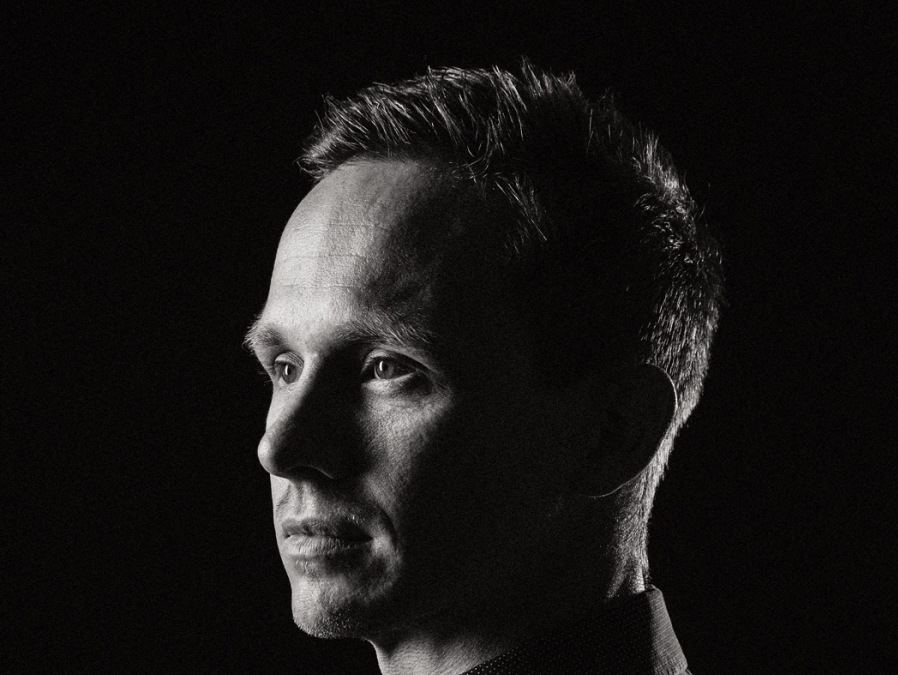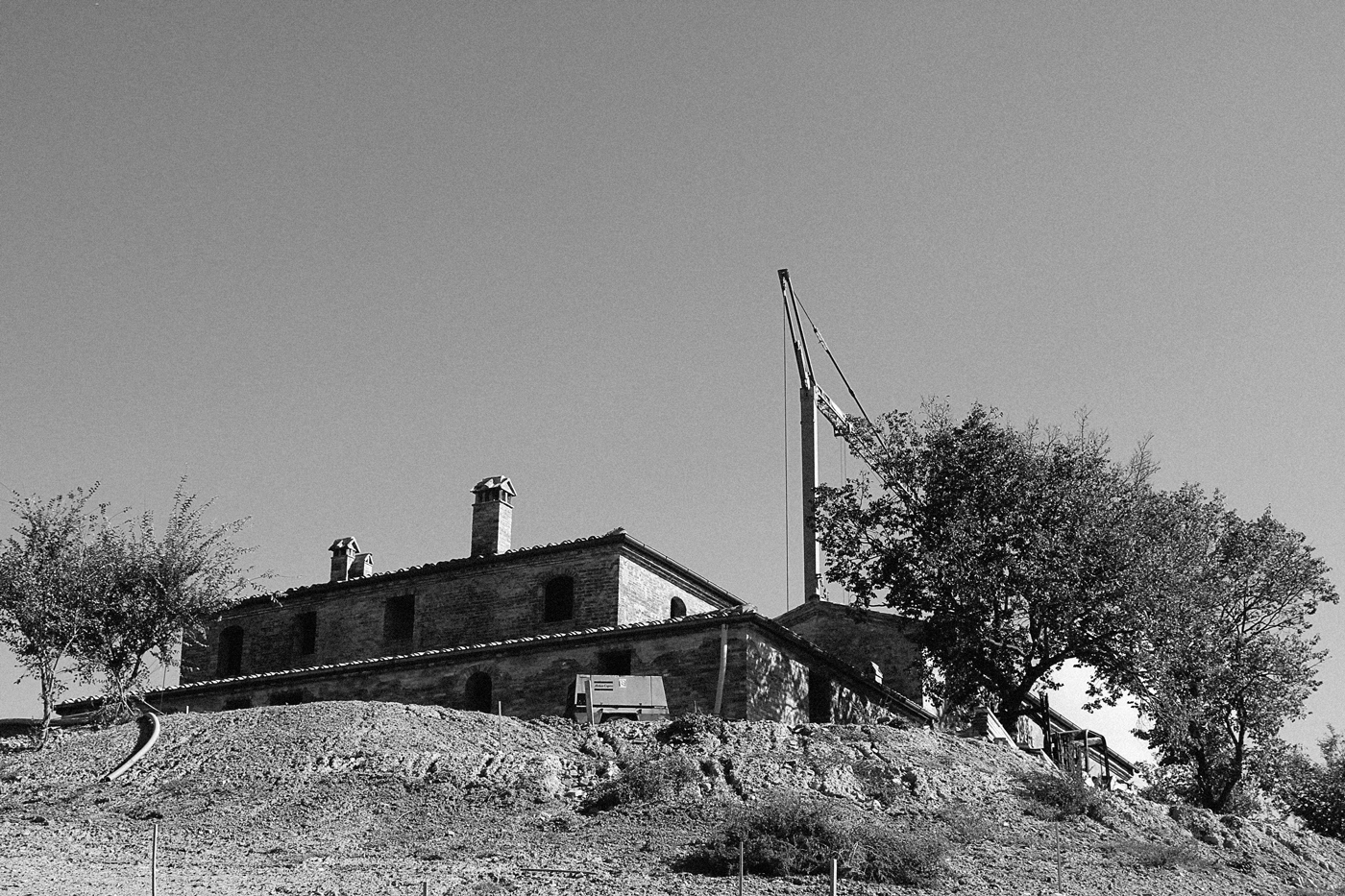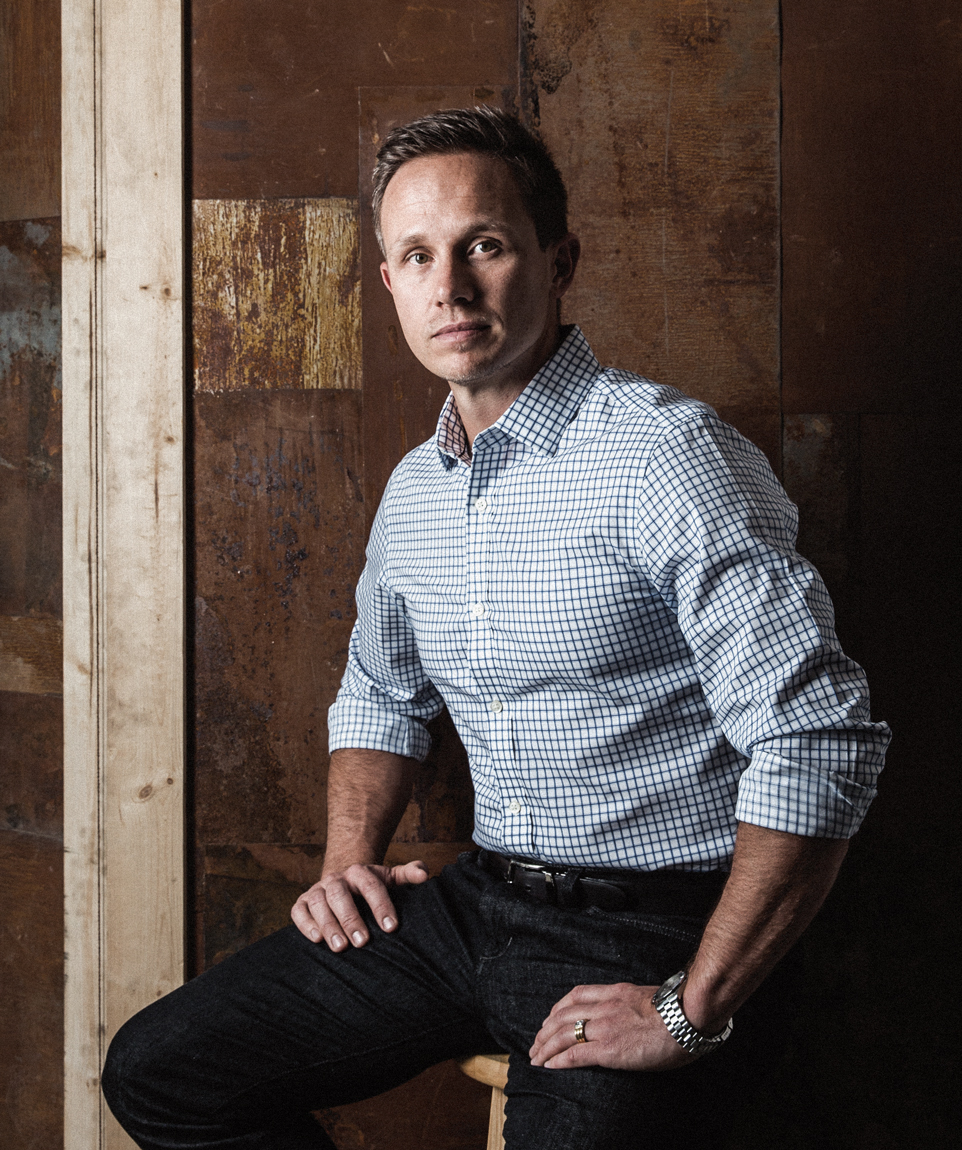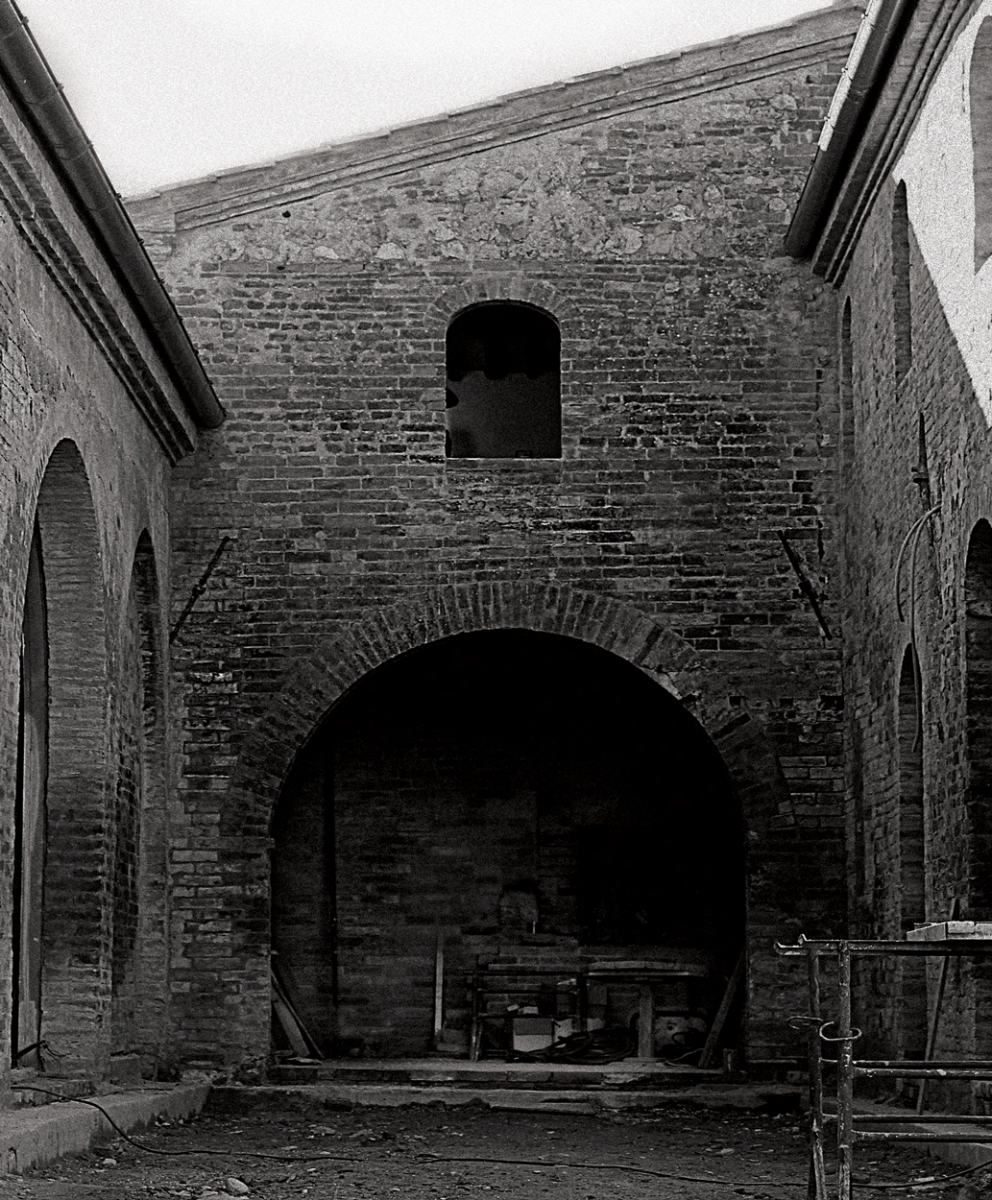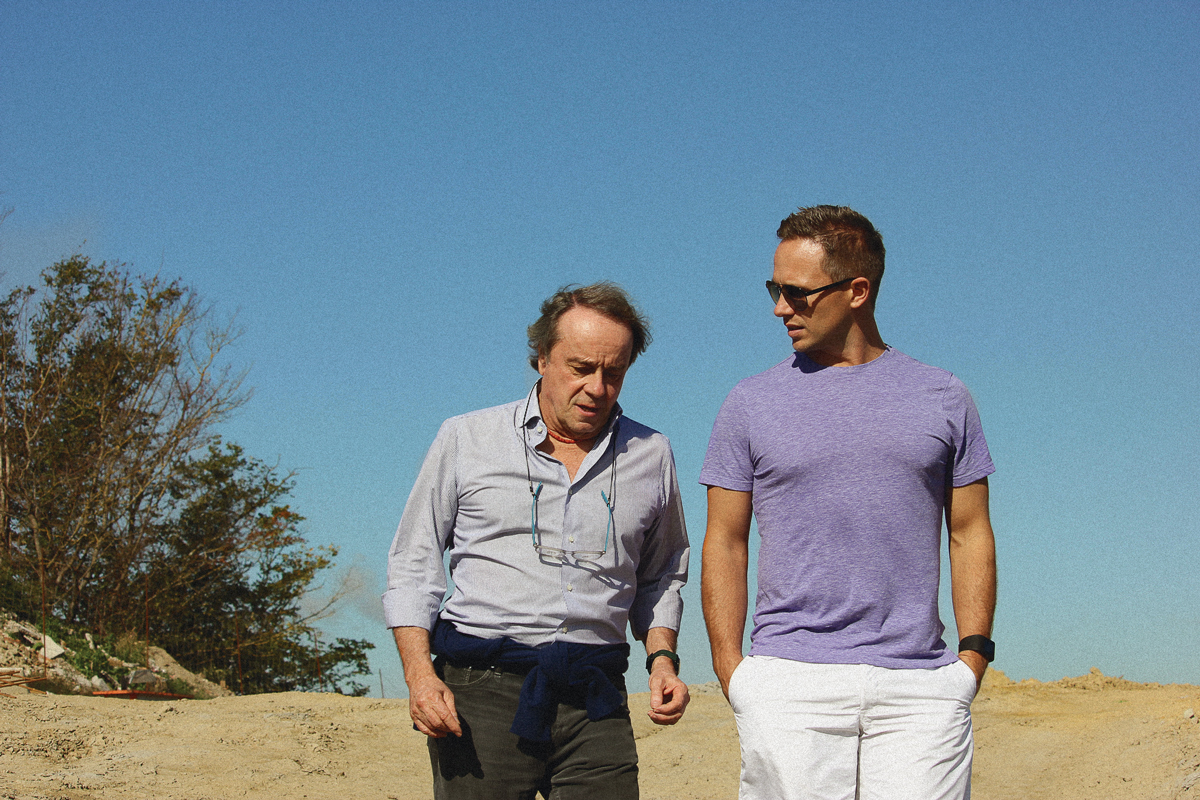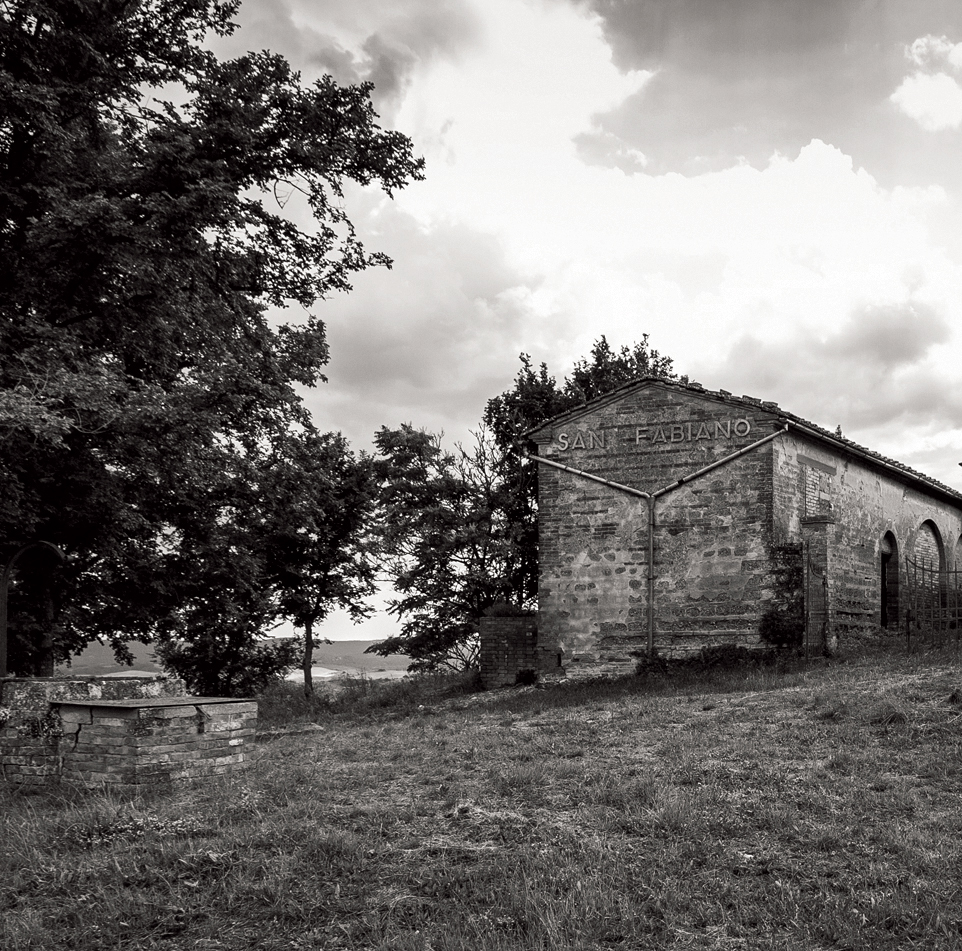The cleaver hits the loin with a thud. Standing over the hulking meat in the middle of a ristorante, the butcher twists the cutting board, allowing two Albertans to inspect their bistecca Fiorentina from all sides. “Does that take you to your roots?” Jonathan Lawrence, always dry-witted and finely dressed, jokes with Stephen Petasky, his friend in plaid. “Bet you haven’t seen one of those in a while.”
It has indeed been a while. Long before Petasky became the president and manager of Luxus Group, he was 10-year-old “Stevie,” carrying styrofoam trays full of cow kidneys and mopping blood in his family’s Strathcona IGA. And Lawrence, Stevie’s best friend, was on the other side of the meat department counter, hoping Mr. and Mrs. Petasky would give him a couple of bucks to sweep the parking lot. Now the two are in Florence, Italy, on business.
Petasky and Lawrence, Luxus’s vice-president of investment strategies, have arrived to check in on the company’s most ambitious single residence yet, Podere Panico, a centuries-old peasant home – or a “ruin,” as they’re called by western prospectors. Overlooking a severe landscape of tilled clay and olive groves, the hilltop estate in rural Tuscany is soon to become a campground for the rich at a cost of $5 million. And while here, they’re hunting for more ruins with a renowned restorations architect, Fulvio di Rosa. All because nine years ago, Petasky – in a hot tub with his father, Don – thought he could monetize vacations by treating them almost like mutual funds.
Luxus, which bills itself as North America’s largest luxury real estate private equity group, is more high-concept than timeshares and destination clubs, but it resonates with 400 wealthy Canadians who have paid upwards of $280,000 or more to hold part of its assets. “It sounds crazy, but people pay us a bunch of money to travel the world and buy vacation properties,” says Petasky, who manages the portfolios and owns a percentage of shares. “If that’s not living the dream, I don’t know what is.” He points and identifies the beef tenderloin and strip loin, simultaneously showing which sections to chop and that he’s not far from his roots after all. The butcher hacks 1,400 grams. “Grazie,” says Petasky, an Avenue Top 40 Under 40 alumnus. It’s about all the Italian he speaks, even after buying three other Tuscan properties over the last five years. But La dolce vita is rubbing off in other ways, apparent as he pores over a wine list. He’ll always be a rye-and-Coke guy, he says, but lately he has appreciated vino’s subtle variances. Not in that swish-and-spit-and-compare-it-to-freshly-opened-cans-of-tennis-balls kind of way, but more in the terms that a young man who has stumbled into luxury knows. He sips it and exclaims, “The flavour just crushes you.”
“You don’t know you’re poor when you’re poor,” says Petasky, whose 35 years are defied both by his irrepressible energy and babyface. Put next to his father, it’s hard to believe they’re not brothers, though that’s largely because they’re only 20 years apart.
Petasky’s parents were teenagers when he was born. Today they’re Luxus partners – Don, as vice-president, and Nancy, as interior designer. But, years ago, Dad managed a grocery store and Mom worked at Ikea. In the late 1980s, they went all-in on one IGA franchise, followed by another. “They re-mortgaged the house, invested in the store, rolled up their sleeves and got to work,” he recalls.
As their Canadian Dream was realized, the family started a tradition of annual vacations, on which the son and parents grew to be so close that, today, they’re next-door neighbours. In 2001, Petasky left business school at the University of Idaho, where he was on a golf scholarship. It would’ve been a harder decision had he shown more athletic promise, but Petasky, ever the realist, ranked low on the team and understood his odds of joining a PGA tour were minute. “Once you get there, you realize there are thousands of amazing golfers,” he says. “In my particular case, I wasn’t going to be in the next level.”
He opened his own IGA in Sherwood Park. He was 21 with 270 employees, and fully insecure that as a perceived trust-fund kid he’d never earn their respect. “My dad said, ‘You’re going to learn how to run a great operation with very little resources. That’s going to carry you through your entire life.'”
Petasky cherishes his parents’ wisdom and the determination they instilled in him. Nothing illustrates this better than the story of how Petasky met his wife, which is best told by Lawrence: “Steve was 23,” recalls his best friend, “and he comes to me and says, ‘So, uh, there’s this girl at my dad’s gym. I think there’s something there, I think I have a chance.’ OK, so who’s this girl?”
Petasky paused, then answered: Carrie Doll.
“I burst out laughing,” says Lawrence. “‘Are you joking? You’re a child! She’s an anchorwoman – CTV News, Edmonton’s sweetheart. No. C’mon. Get some realistic expectations.’ He’s like, ‘No. I can do it.'”
And he did. Petasky, 25, and Doll, 34, married two years later.
Since leaving TV news in 2014, Doll has joined the family business, contracted as a part-time communications and marketing consultant. Their boy and girl are now the same age Petasky was when his parents opened their franchises, but the children’s surroundings couldn’t differ more. Whereas he remembers a time when the family struggled financially, Kasha and Allegra know no such thing. Last year, the family lived in Hawaii while Luxus constructed its first subdivision of mid-market homes. Petasky and Doll cannot, as Petasky’s parents did, humble their children with packaging chicken livers, but they try to keep them grounded, making them earn a dollar by cleaning up around the office. “It’s up to us to educate him,” says Petasky of his son. “We’re not going to rewind our lifestyle. We have to work twice as hard to make sure he understands why he has what he has and instil a similar work ethic and the value of a dollar.”
Heading into Luxus’s first decade, Petasky, as its managing partner, must also consider the value of a dollar for 400 shareholders, most of whom are Albertans. Luxus is capping vacation funds until 2020 and buckling down for the province’s hardest recession since the 1980s by diversifying. Hence, the subdivision in Hawaii, which has sold out its first phase, and why the firm hopes to turn Panico into an international retreat. Petasky sees Panico not just as a legacy project for future recreational developments, but recession-proofing. “It’s better for us and all Luxus clients to have revenue streams from outside the province [and] Canada.”
In a rented Fiat, Lawrence and Petasky dislodge from Florence’s morning crawl and glide around country hills, Sangiovese vineyards and effervescent valleys. They cruise through Via Francigena – or “pilgrim’s road,” a path to Rome walked by pious pedestrians for 2,000 years – and turn into Monteroni d’Arbia, a working-class town nearest to their new property. Back in the countryside, ascending a steep hill, di Rosa comes into view. He’s short and swarthy, with long grey hair. Blue designer eyewear on adjustable strings rest on his navy sweater. At the moment, he’s on the phone and gesticulating wildly. “Watch,” says Lawrence, “the more passionate he gets, the closer his hands get to his armpits.”
Petasky and di Rosa met at Borgo di Vaghli, a 14th Century mountaintop hamlet he restored into Tuscany’s first fractional ownership property. Borgo is too authentic and too rustic for many would-be investors/guests. But Luxus snapped up two of the homes for its Elite Collection portfolio, keeping one residence as is and furnishing the other with modern leather sofas furniture and a wide-screen television for the clients who are, perhaps, authentically North American. Di Rosa only felt slightly violated and they became fast friends. Petasky offered di Rosa’s son Edoardo, who’s writing his thesis on fractional housing, an internship. Two summers ago, di Rosa stayed with Petasky’s family in Sherwood Park, bringing, as always, tanks of his personally pressed olive oil as gifts.
Petasky practically jumps out the passenger side and hikes to di Rosa, who quickly ends his call and kisses the Canadian’s cheeks. “I can’t stand to just talk by email anymore,” the architect cries. They eventually turn their attention to the 7,500-sq.-ft. former grain house, or podere, undergoing a gradual transformation at the careful hands of di Rosa’s tradesmen. In muddied slacks and sweaters, the men in their 60s and 70s look nothing like Canadian contractors, nor do many of their tasks: washing stones in barrels and spending up to 50 hours covering one room with coats of paint laced with dirt to send the walls back to 1598. That’s when peasant caretakers on the San Fabiano estate lived upstairs, above the heat- (and smell-) emitting livestock.
When Luxus bought Panico for 800,000 in 2014, one corner of the residence had already collapsed. Eschewing cheaper, newer materials, di Rosa rebuilt it with antique brick and roof tiles costing 20 apiece to make it look good as old. A few olive trees remained but, by referencing archival photos, di Rosa planted a grove, plus other native plants. In a decade, the terrace will be identical to how it looked 60 years ago, when the last farmers left and the five-acre lot started languishing and waiting for prospectors like Luxus.
This summer, it will be a seven-bedroom, 10-bathroom villa with a pool and caretakers’ suite, an expansive courtyard and a fornoso deep it’s practically a spare room. Ten shareholders will occupy it for half the year and, during the remainder, it’ll generate revenue as an international corporate retreat, starting at 10,000 per week.
Di Rosa ties his sweater around his waist and claps. “Let’s see the house!” Di Rosa earned his reputation as an architect, counting amongst his clients (and friends) Frances Mayes, author of Under the Tuscan Sun, the memoir and movie about solving a mid-life crisis with a farmhouse restoration that officially put the cottage industry into overdrive. But, in fact, he’s trained as an engineer, having practiced in Brazil under the tutelage of Oscar Niemeyer, a visionary who designed the capital, Brasilia, from scratch. This is what makes di Rosa a master restorer. Engineers are, above all, problem solvers, and, when dealing with buildings that are 400 years old, problems are plentiful.
But at this stage, most of Panico’s conflicts are cultural – Luxus clients’ tastes mismatching with those of proud Tuscans. Take, for example, a dining table. Fulvio envisions for Panico bench seating to accommodate any number of guests as cleanly as possible. But as a corporate retreat, or office from home, guests could spend half their day working at the table. “It would be hard to me to say to someone that it’s a comfortable environment for 12 hours a day,” Petasky tells di Rosa while making a case for cushioned chairs.
But if there are way more seats than guests, says di Rosa, that’ll diminish the homey feel. “Why would a family of six have 12 chairs? That’s not functional! If I have an extra seat here, I get mad because I don’t know what to do with it.” Petasky is taken aback by the Italian’s passion. “It’s a big issue, it’s an enormous issue,” continues di Rosa, hands curling ever closer to this armpits. “Imagine, three times a day, having six extra chairs. Even two!”
They’re momentarily silent. The senior workers, breaking in the adjacent room with cigarettes, espresso and a four-litre jug of wine, watch with intrigue.
“I got it!” exclaims di Rosa. “Let the caretakers know how many guests in advance, and they’ll set the chairs.” The resolution is capped with laughter and sighs. Di Rosa and Petasky, turn outside the arched brick window framing the landscape outside; tilled clay, rolling hills, S-shaped and cypress-lined gravel roads.
“Look at that,” says Petasky, almost whispering. “I just can’t get over it.”
After starting their day as they often do, with a five-kilometre run, Petasky and Lawrence head out in the Fiat to go ruin-hunting with Di Rosa. They see half a dozen properties, some easier to get to than others, but every one as urgent as the next – so they’re willing to trespass, get stuck in the mud and slouch under some sketchy roofs to examine the inventory. Their hope is to buy up to four more for Luxus, converting each into a rented retreat, and then flip it for investors after a few years. But few of the remaining houses are worth salvaging, says di Rosa. “In terms of a ruin that’s authentic, has interesting architecture, has a view without problems like a 10,000-kilowatt pole?” he rhetorically asks. “Under 20.” His prognosis is four or five years until they’re snapped up.
Adding to the urgency, Tuscany’s stringent vista-preservation laws prohibit building any additional rural homes, in order to preserve their striking landscapes. So once a structure collapses, it’s either rebuilt on the exact square footage, or not at all. Di Rosa is disinterested either way. “For certain people in your own country” – meaning Canada – “tearing it down and doing the same is credible. Well, it’s not. It’s not credible. It’s fake.”
Coming from a city where no heritage building is too sacred, Petasky is an unlikely saviour of these Tuscan treasures. There was a time where he didn’t care, when a reconstruction like the other three Luxus-owned Italian homes was equally satisfying. But once one experiences the differences between a restoration, like di Rosa’s, and a reconstruction or hybrid, Petasky says, “you kind of drink the Kool-Aid. This is something pretty special that few people will get a chance to do.”
It’s obvious what impressions di Rosa has made on Petasky, but the reverse is less detectable. Twice his age and multitudes more stubborn, the architect is mostly unimpressionable. But later in the night, over Dina’s feast in Borgo di Vagli’s cavernous restaurant, di Rosa admits Luxus has made him more flexible to North Americans’ values, pointing to yesterday’s bench-versus-chairs debate.
Di Rosa then pours a glass of red wine and hands it to Petasky, challenging him to guess its origins. Petasky has been quietly practising tasting all week, but not aloud. Laughing nervously, he sniffs it, looks at the edges of the wine and notes the colours. He swirls and sips it with his eyes closed. “Bolgheri?”
“Correct!”
Petasky lights up with a huge smile. “No way!”
“Congratulations,” says di Rosa, high-fiving him. “You crushed it!
